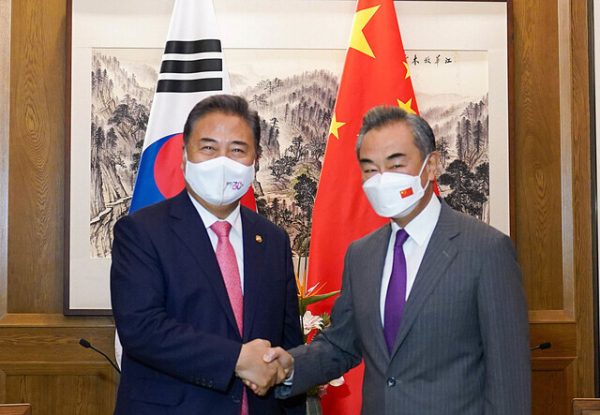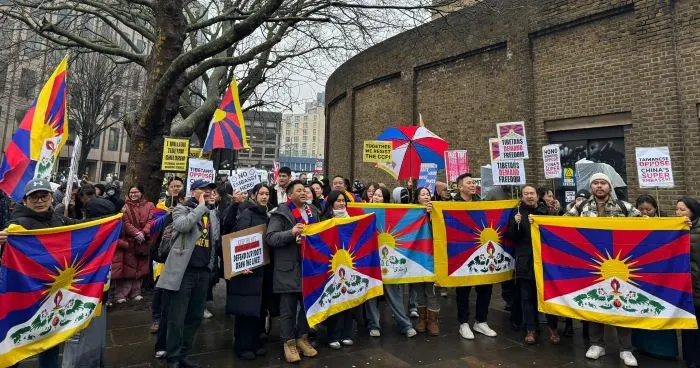Don’t Mistake South Korea’s Yoon Suk-yeol for a China Hawk
We are now more than 100 days into Yoon Suk-yeol’s tenure as South Korea’s president – and 30 years into official China-South Korea relations. It seems a good time to take stock of the Yoon administration’s approach toward China.
Coming out of the election campaign, the right-leaning Yoon was widely perceived outside of South Korea as a pro-U.S., anti-China choice. While this may be true relative his left-leaning opponent, Lee Jae-myung, he should not be mistaken for a China hawk in any absolute sense.
As former senior diplomat Wi Sung-lac put it, “South Korea has never had, and still doesn’t have, a thought-out China policy, other than trying hard not to anger it.” On most issues, South Korea seems to find that easier than most countries.
Like other U.S. allies, Seoul cut official relations with Taiwan in favor of diplomatic relations with Beijing. However, it did this relatively late (in 1992), and was willing to gratify Beijing and rub Taipei’s nose in it to a degree other countries weren’t. Notably, South Korea decided to not provide Taipei with sufficient warning to sell its diplomatic real estate in Seoul, allowing it to pass into Beijing’s hands. South Korea was also one of the first countries to resume business as usual with Beijing following the Tiananmen Massacre in 1989. More recently, Seoul declined to join Australia, Canada, Japan, and others in criticizing Beijing over human rights in Xinjiang or Hong Kong.
Diplomat Brief Weekly Newsletter N Get briefed on the story of the week, and developing stories to watch across the Asia-Pacific. Get the Newsletter
The one real sticking point where Seoul can’t easily give Beijing what it wants is its alliance with the United States. Both sides of Korean politics agree that the alliance should be maintained. However, rather than as a global alignment with the U.S., the South Korean establishment sees the alliance as more of an insurance policy against North Korea. Chinese pressure on Pyongyang is also seen as an indispensable for managing inter-Korean relations. Seoul thus seeks to walk a line between not making Beijing angry and satisfying Washington enough that it remains committed to South Korea’s defense.
Enjoying this article? Click here to subscribe for full access. Just $5 a month.
Beijing understands this much better than Washington. It sees South Korea, as the ancient Chinese expression puts it, bending like grass in the direction the wind blows. As a South Korean think tank recently lamented, “Of all the countries with which we have diplomatic relations, there is no other country that treats South Korea as dismissively as China.” Beijing waves carrots and sticks in South Korea’s direction, chiefly related to the exports Seoul is perennially promoting or help regarding Pyongyang. And it refuses to compromise, ensuring Seoul doesn’t give Washington too much of what it wants. China also knows that Korean sentiments mean it doesn’t have to worry South Korea will move much closer to Japan as a counterbalance, despite what the Yoon administration may say.
This means that the U.S. pulls, and North Korea pushes, Seoul up to lines that Beijing will not allow it to cross, resulting in perpetual Korean angst. We can discern Yoon’s approach to China from how his administration responds to these lines.
The Terminal High Altitude Area Defense (THA) missile defense system is the most obvious case in point. The right-leaning Park Geun-hye administration agreed to deploy a U.S. THA battery in 2017, in what it said was a defensive step against growing North Korean capabilities. Beijing declared Seoul was colluding with the U.S. to threaten China, and unleashed de facto sanctions. The subsequent left-leaning Moon Jae-in administration tried to convince Beijing to lessen the chill, promising no additional THA batteries, no participation in a U.S. regional missile defense framework, and no trilateral military alliance with Washington and Tokyo (the “three noes”). The results were mixed, as Moon did not go as far as Beijing wanted.
A minor theme of Yoon’s presidential campaign was that Moon had been too supine toward Beijing in relation to THA and other issues, with candidate Yoon promising to expand THA deployment if he was elected. However, after winning the election, Yoon continued the tradition of trying to not make Beijing angry.
Instead of a unilateral decision on THA, Seoul is trying to convince Beijing to acquiesce to an enhanced deployment. So far Beijing has refused to budge. Seoul’s statements on the issue have been widely interpreted as defiant. But it appears that it is continuing to avoid provoking Beijing, settling for an upgrade of base facilities rather than any increase in capabilities.
The second case study is U.S Speaker of the House of Representatives Nancy Pelosi’s recent visit. Pelosi’s plan to visit South Korea after Taiwan presented the Yoon administration with a serious headache. Beijing was watching to see which leaders would line up in support of Pelosi’s Taiwan trip or criticize its saber-rattling. Yoon’s people may have reasoned that the apparent disagreement between the speaker and the White House over the wisdom of the trip, and her lower rank relative to Yoon’s status as head of state, meant that snubbing her would not be perceived as anti-U.S. alliance. If so, there was no need to make Beijing angry over this issue, and Yoon’s ongoing vacation (despite being in Seoul) could be used as an excuse for his not meeting Pelosi when she came to Korea.
The all-too-predicable outcry that this was not an appropriate way to treat a high-level U.S. official saw Yoon flip-flop and hold a phone call with Pelosi. Seoul then publicly avowed that Taiwan had not been discussed during the call. If the reaction of the Chinese state media is any indication (and it is), Beijing was pleased with Pelosi’s cold reception.
A final conundrum facing Yoon – perhaps the biggest of all – is how to respond to the “Chip 4” semiconductor cooperation initiative involving the United States, South Korea, Japan and Taiwan. The reason why this is so important is that it touches on what many Koreans see as the overriding national priority: being a high-tech exporter.
While the U.S. and Japan see Beijing’s goal of technological superiority as a pressing security issue, Seoul sees it as more of a commercial threat. Seoul does not want to be shut out of the initiative, as then U.S. subsidies and technology will flow to its Japanese and Taiwanese competitors. On the other hand, South Korea doesn’t want to be perceived as part of a containment effort, as Beijing would retaliate against Korean semiconductor operations in China. Beijing sees Chip 4 as a threat to its rise to global preeminence.
The current plan is to try to have it both ways. Seoul hopes that strategic pressure from the United States means China can’t afford to kick Korean chips out of its market, giving it leeway to take part in Chip 4. And regarding Washington, Seoul assumes it needs Korean cooperation against China, and thus will overlook the fact that South Korea is still cooperating with Beijing on upgrading its technology.
Enjoying this article? Click here to subscribe for full access. Just $5 a month.
All considered, Yoon’s approach to China is clearly more dovish than hawkish. True, polls show Koreans to have some of the least favorable attitudes toward China in the world. But the importance of China to Korean jobs and wealth, and the need for South Korea to avoid entanglement in China-U.S. rivalry, are both taken for granted by the Korean public. A president as historically unpopular as Yoon will not make himself more popular by standing up to Beijing.
Unsurprisingly, Beijing’s response to this approach has been to hold firm. It issued five points for Seoul to improve the relationship, centered on South Korea distancing itself from the United States. A Korean think tank described the demands as “an expression of an anachronistic Sinocentrism that reflects the attitude of a suzerain towards its tributary state” and “an act that leaves a scar on the 30 years long Korea-China relations.”
The popularity of the U.S. alliance among the public means that Seoul is not going to distance itself from the United States. But it will continue to equivocate and fret about how to get the China relationship back on track and avoid further angering Beijing.
Does this mean China is winning and the U.S. losing? Not necessarily. The United States itself equivocates on China, and at times wants to avoid making Beijing angry. As Joseph Nye said more than a decade ago, only China can contain China. Beijing seems to really believe that it can cajole South Korea into ending the alliance with the United States as part of a wider push to pressure the U.S. out of East Asia. Its habitual free riding notwithstanding, Seoul opposes those aims, and increasingly so as Chinese pressure intensifies. So on net, South Korea is probably a growing contributor to the coalition pushing back on Chinese ambitions.













